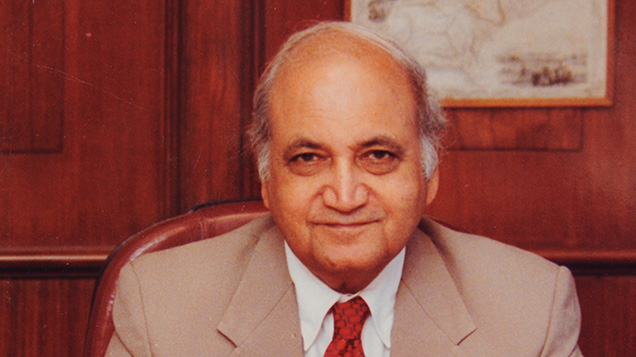
- Former Chair, Mahindra Group (Diversified)
“Fundamentally I think what we believed in, and we still do, is in the dignity of the individual. We strongly feel that no matter what you do, you have to recognize that.”
Summary
Keshub Mahindra was the chairman between 1963 and 2012 of Mahindra & Mahindra, a diversified family business group headquartered in India, which got its first start by selling and manufacturing utility vehicles. In this interview, Mahindra reflects on the arc of his career and the evolution of his business.
To begin the interview, Mahindra discusses the inception of Mahindra &Mahindra. First started as Muhammad & Mahindra in 1945 in a partnership between Keshub’s father and his father’s friend, Ghulam Muhammad, Keshub joined the company in 1947 after graduating from Wharton with an MBA. In 1948, the company was renamed Mahindra & Mahindra, but kept the original business philosophy, which was to do something broadly that would promote business in India and to set up an infrastructure that would help contribute to the eradication of inequalities within India. Mahindra explains why they decided not to go into a consumer-oriented business and instead went into capital products, specifically the automotive industry. Mahindra reflects on the first two decades of his company and describes some of the negative surprises and disappointments he dealt with, largely around the theme of interactions with the Indian government. The circumstances he describes includes the amount of controls occurring under the License Raj, and issues with the administrative and governance system as a whole. Mahindra furthers this discussion in a description of India as a weak democracy, expresses disappointment in the relationship between politics and business in India, and conveys hope for the future and calls for a change in the country’s priorities.
The interview continues as Mahindra describes the corporate culture of Mahindra & Mahindra where the dignity of the individual is recognized, where their employees are empowered through a series of practices, where there is a strong value system, and where there is an ethics system that cannot be compromised on. Mahindra then turns to the importance of business giving back to society and explains that 80% of their charitable contributions goes towards education – primarily women’s education.
Mahindra then examines what he describes as a fundamental flaw in the pattern of employment in India and weak Indian labor laws, where companies tend to hire temporary laborers with different wage structures from permanent employees, and where the ratio of these temporary employees that can be fired at any time is very high. In 2013, this situation led to a series of strikes at Mahindra & Mahindra’s Igatpuri plant.
Mahindra explains his close relationship with Indira Gandhi, the Indian prime minister between 1966 and 1977, and 1980 and 1984. He describes the qualities of Gandhi that made her a good leader, including her decisiveness and her ability to govern. Mahindra also looks back at the reform process and liberalization in the 1990s in India. He reflects on how the company confronted global competition for this first time and the guiding principles he used for company’s global expansion and joint ventures. When thinking about what his company is best at now, Mahindra argues that Mahindra & Mahindra is great at dealing with global competition, engaging in foreign operations, acquiring foreign companies, and deciding which foreign partnerships to take on.
To conclude the interview, Mahindra discusses his purchase in 2009 of Satyam, a leading software company, which would have otherwise collapsed due to a scandal involving the company. He also discusses the importance of enforcing the Panchayat system in India, a three-level system of self-governance within rural Indian villages.
Video Clips by Topic
Diversification
Social Responsibility
Keshub Mahindra, who was Chair of the India-based diversified business group Mahindra and Mahindra, explains why he believed that businesses must be involved in development in India: “How many villages have no water?”
Additional Resources
- Innovation at Mahindra & Mahindra (A) [HBS Case]
- Innovation at Mahindra & Mahindra (B) [HBS Case]
- Innovation at Mahindra & Mahindra (C) [HBS Case]
- Mahindra & Mahindra: Leveraging India’s Size for Global Scale in Tractors—A Profile of One of India’s Pioneering Multinationals [Harvard Business Press Chapters]
- Mahindra "Rise": A Brand Architecture Decision [Ivey Publishing]
- Mahindra and Mahindra Finance Services Limited: Empowering Rural Customers in India [Ivey Publishing]
- Mahindra Aerospace: Looking Ahead [Ivey Publishing]
- Harmonizing Demand Forecasting and Supply at Mahindra & Mahindra Ltd. [Ivey Publishing]
- Tech Mahindra and the Acquisition of Satyam Computers (A) [Ivey Publishing]
- Mahindra & Mahindra in South Africa [Ivey Publishing]
- Mahindra & Mahindra Ltd.—Farm Equipment Sector: Acquisition of Jiangling Tractor Company [Ivey Publishing]
- Mahindra & Mahindra: Creating Scorpio [HBS Case]
- Finding a Higher Gear [Harvard Business Review]
- The Future Is Far from Home: An Introduction to Reverse Innovation [Harvard Business Press Chapters]
- Harmonizing Demand Forecasting and Supply at Mahindra & Mahindra Ltd. [Ivey Publishing]
- Keshub Mahindra, Manager in Wonderland. Administrative Staff College of India, c. 1973
- http://www.mahindra.com/Who-We-Are/How-We-Got-Here
- Thought Leaders: Insights On the Future of Business, edited by Joel Kurtzman. Booz-Allen & Hamilton, c.1998
- Interview with Anand Mahindra: http://ico.osu.edu/ICO_Site/Critical_Conversations_files/Charlie%20Rose%20Interview%20Transcript.pdf
- Peter Church, Profiles in Enterprise. Inspiring Stories of Indian Business Leaders (Roli Books, New Dehli, 2015), pp. 232-245.
- Video file of this interview available at Baker Library Historical Collections, histcollref+hbs.edu. Harvard ID holders can access the full-length video above.
Interview Citation Format
"Interview with Keshub Mahindra, interviewed by Tarun Khanna, Mumbai, India, July 24, 2013, Creating Emerging Markets Project, Baker Library Historical Collections, Harvard Business School, http://www.hbs.edu/creating-emerging-markets/."
